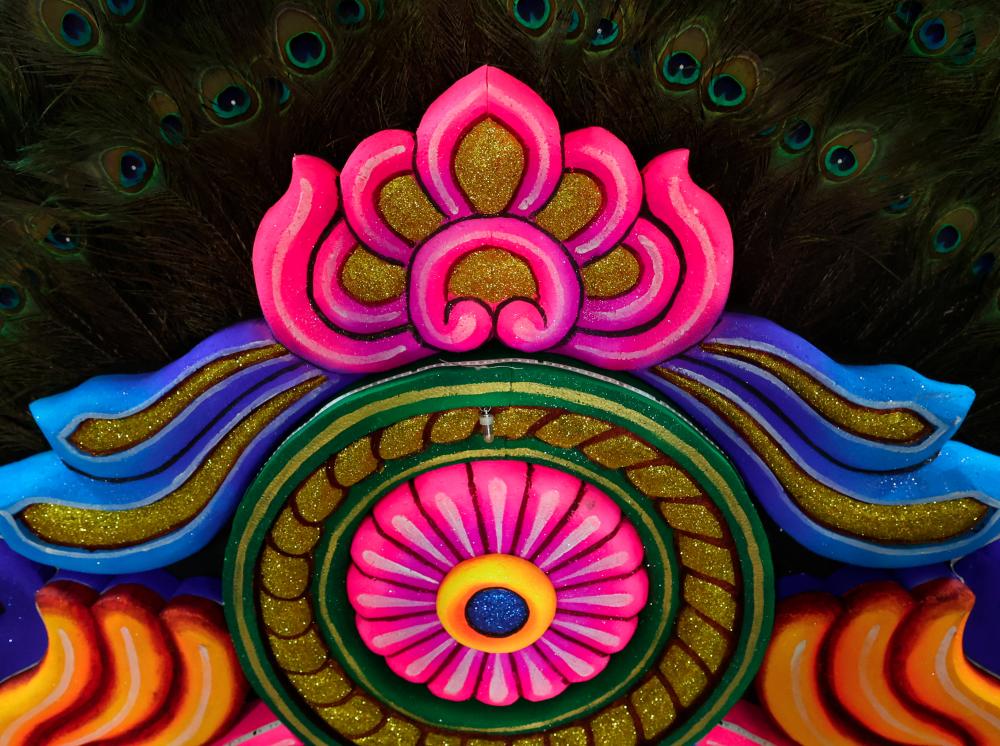KUALA LUMPUR: On Thaipusam day, Indian devotees, in yellow clothes and with bodies covered with the holy ash, carrying well-decorated ‘kavadi’, bearing pots of milk while walking towards the temple by enduring the pain to fulfil their vows.
The Tamil term ‘kavadi’ means a burden or load, which is carried on the shoulders as a form of sacrifice to the Hindu god Lord Murugan, as an opportunity to offer their thanks when those vows are fulfilled by their deity.
Although there are many types of kavadi, kavadi maker Selvaraja Kaliyaperumal pledged to only make Mayil Kavadi (kavadi made of peacock feathers) as a symbol to preserve the tradition because the peacock is believed to be the sacred vehicle of the Hindu deity, Lord Murugan.
The 54-year-old man said that his love for constructing peacock kavadi has never wavered since he learned the art of kavadi-making from his late father, 25 years ago, and is now inherited by his two sons, S.Teenesh, 27, and S.Satish Raj, 25.
“Since those days, I only made kavadi made of peacock feathers because the original kavadi is from peacock feathers, besides, peacock kavadi is more beautiful and natural, compared with the artificial kavadi.
“Our main kavadi are for rentals for devotees in the Sri Subramaniar Swamy Temple, in Batu Caves, Selangor, where peacock kavadi have been famous in this temple for every Thaipusam celebration since those days,” he told Bernama.
The trio’s kavadis receive high demand every year, and a few orders come from overseas, including South Africa and Mauritius.
Meanwhile, Satish said that, to add more vibrancy to peacock feather kavadi, they added some decorations with light-emitting diode (LED) light to look more attractive, particularly, at night.
“We imported the LED lights and peacock feathers from India. We used roughly 1,000 to 3,000 peacock feathers for one kavadi and around 10,000 peacock feathers for seven kavadis,” he said.
He added that this year, kavadi rentals range from RM800 to RM1,300, depending on the size and design.
Apart from peacock kavadi, there are Paal Kavadi (devotees carry pots filled with fresh cow’s milk); Panneer Kavadi (bearers carry sanctified water or rose water); Karambu Kavadi, which is usually performed by parents who have been blessed with a child and will carry him or her with sugar cane poles to express their gratitude, and Pushpa Kavadi (flowers kavadi).
Thaipusam is observed by Hindus all over the world in the month of ‘Thai’ in the Tamil calendar, to commemorate the act of Goddess Parvati presenting the ‘vel’ (lance) to her son Lord Muruga, as an embodiment of her ‘shakti’ or power to vanquish the evil Soorapadman and restore peace and well-being.
Besides Batu Caves, Thaipusam, which falls on Jan 25 this year, is also celebrated in a big way at the Sri Arulmigu Balathandayuthabani Temple, located on a hill in Penang, and Arul Subramaniar Temple, close to the Cheruh limestone hills in Ipoh, Perak. - Bernama









